I’ve been struggling to read lately, which is frustrating because books are usually a great source of comfort and diversion for me. But in the last few weeks my mind has been too overwhelmed by all that is going on in the world to focus on a book. When I do read, the content feels eerily irrelevant because it was all published BEFORE our world sort of fell apart.
Despite not being in a mood for reading, I keep turning back to books, if for no other reason than out of habit. Today I’m sharing reviews of five books I read in the past month (with the caveat that my impressions were likely less enthusiastic than they might have been if I’d read them during a more “normal” time).
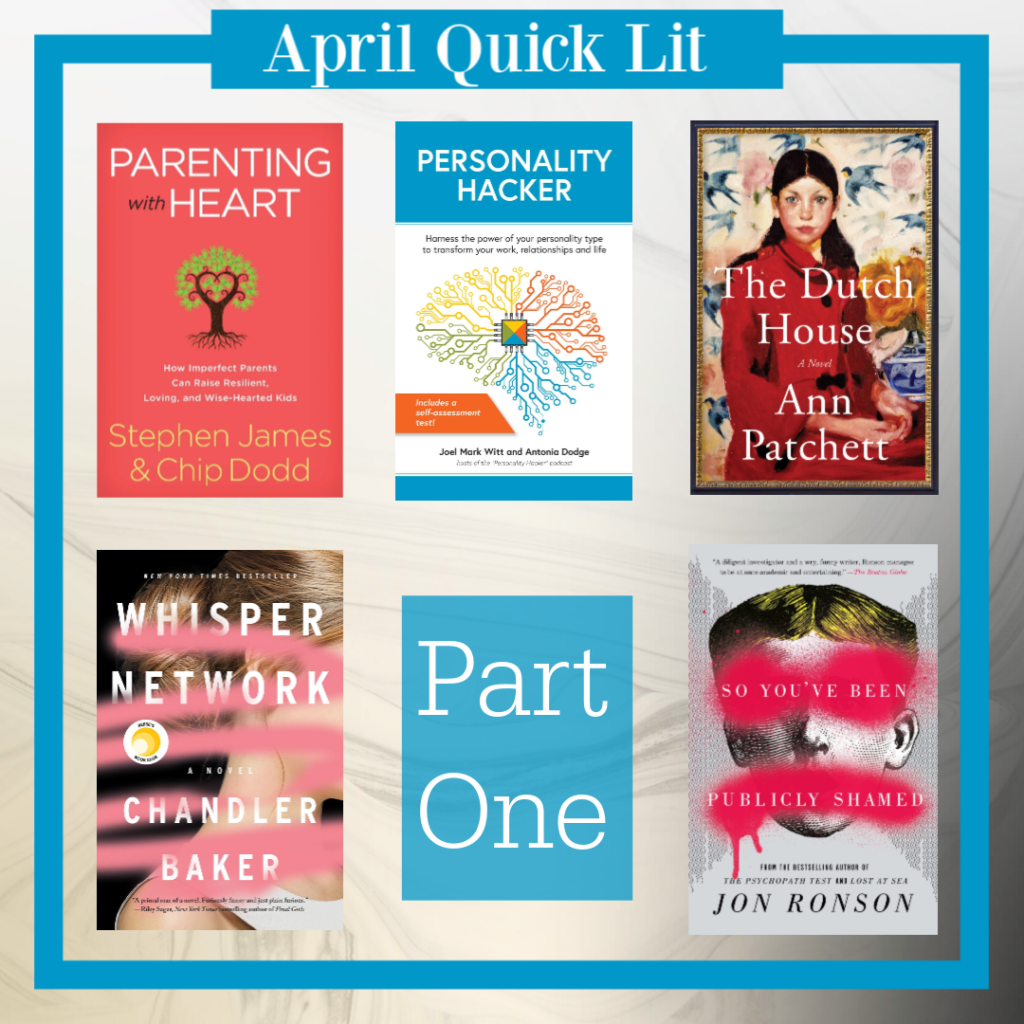
Whisper Network, by Chandler Baker: Sloane, Grace, Ardie, and Rosalie are four very different women who all work for an Austin-based athletic company whose CEO recently passed away. This loss means that the women’s boss, Ames, will be taking over the company. However, the women in the company all know that Ames has not always been above board when it comes to the treatment of his female employees. To put a halt to Ames’s advancement, the women take matters into their own hands in a move that leads to catastrophe for nearly everyone involved. As more lies are exposed, these women each begin to question their status in the company, their identities as employees and mothers and wives, and whether or not these roles can coexist.
In light of the current #metoo movement, this is obviously a very timely read. The book addresses themes of sexual harassment, consent, and women in the workplace, adding flesh to subjects that can feel sterile amid news headlines and heated debates. While I felt the handling of these subjects was a little too on the nose and extremely biased, it was interesting to see how such circumstances might be experienced by “real” people. (Having never been a female in a business environment, I can’t speak to whether or not their experiences are an accurate portrayal of what is actually going on in these settings.) I thought the exploration of how women treat one another was the most intriguing theme, and the one that felt the least contrived.
Outside of the pointed themes, I did find this to be an engaging read. The characters are interesting and well-drawn, and the mystery element is compelling. Although the narrative style bothered me a bit (mostly told from a plural first person point of view), I found the overall structure intriguing. Baker is a talented writer and I would love to read something a little less agenda-pushing from her.
My Rating: 3 Stars.
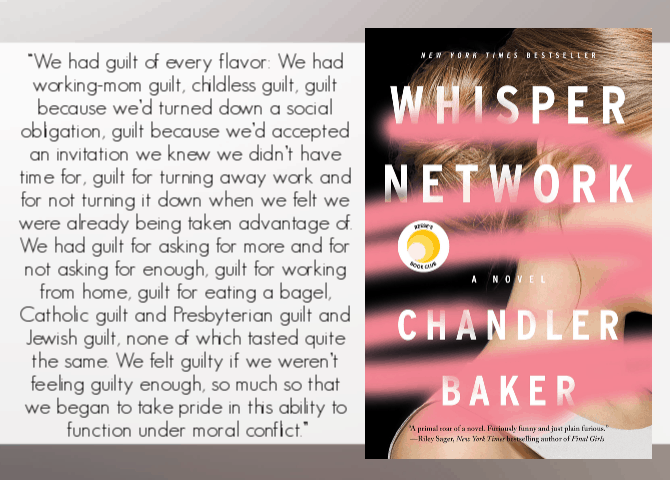
Parenting With Heart, by Stephen James and Chip Dodd: There’s a lot of pressure on today’s parents to be “perfect.” Thanks to social media, we are all hyper-aware of how others are parenting and how their kids are performing (or at least, how others want us to think they are parenting and how they lead us to believe heir kids are performing), and we do everything we can to keep up. We read the books and listen to the podcasts and try all the tricks—because we can’t bare the thought of somehow failing our kids as a result of our parenting inadequacies.
By “we” in the previous paragraph, I of course mean “me”—because unfortunately my perfectionism in all areas of life extends to my desire to achieve perfection in my parenting. Sadly, perfect parents don’t exist, but according to the authors of Parenting with Heart, it’s totally fine. In fact, our kids don’t need perfect parents; they need “good enough” parents who are authentic, whole-hearted, engaged, and willing to mess up and move on.
In this book, therapists Stephen James and Chip Dodd free parents from the burden of perfectionism and guide us in learning to parent from a place of emotional honesty and intimacy. They explain that we need to let go of our own baggage and accept our personal flaws so that we stop projecting our issues and expectations onto our children. Only when we begin to parent from an emotionally and spiritually healthy place can we establish relationship as the end-goal of our parenting, because it is relationship with us that our children need most.
I loved how freeing this book was. Instead of a list of to-do’s to follow, I was reminded that the most important thing I can do as a mom is be myself and love my kids. I appreciated that this book took the focus off of the child’s behavior and shifted it to the parents’ approach and well-being (which feels much more manageable!).
My only complaint with this book is that it left me wanting more. It touches on quite a few different concepts and ideas, and I felt the authors could have elaborated on each of them. Still, a helpful read and the authors’ humorous and transparent stories make for an engaging and memorable book.
My Rating: 4 Stars.
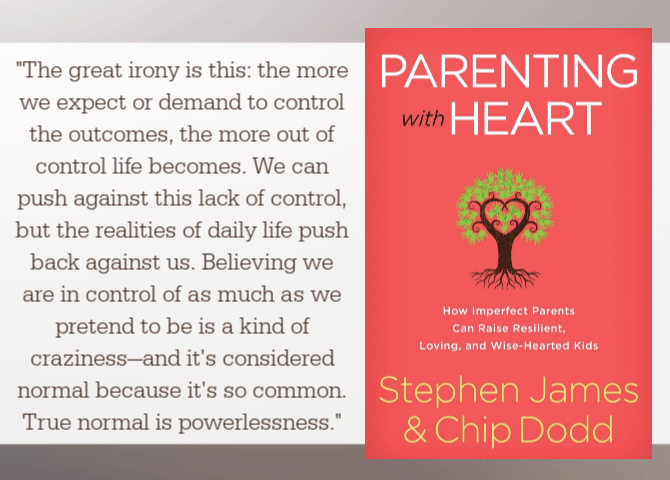
The Dutch House, by Ann Patchett: The Dutch House follows two siblings, Danny and Maeve, throughout their lives, beginning with their formative years in their family home (the titular Dutch House) and continuing through their mother’s disappearance, their father’s emotional neglect and unusual remarriage, and Danny’s adult life with his wife and children. Though intelligent and ambitious, Danny and Maeve struggle to overcome the traumas of their youth, which serve to unite the coddled younger brother and overbearing older sister in ways that are somewhat heartwarming yet ultimately problematic.
This book has gotten a lot of buzz and I couldn’t wait to dive in. The description as a character-driven novel of a troubled family that spans decades—a book that is both epic in scope but intimate in execution—seemed to sit squarely in my reading wheelhouse. Anne Patchett is an insightful writer, and the book excels in bringing fairytale vibes to life through vibrant characters.
I listened to the audiobook narrated by Tom Hanks, and while his reading is amazing, I didn’t much care for the novel itself. The loathsome characters (believable yet unlikeable) failed to earn my sympathies or even my interest, and the lack of plot left me feeling bored and hoping for the book to hurry up and end. (I’m not quite sure why this is, because I’ve enjoyed plenty of character-heavy, plot-light books in the past; I do wonder if I would have enjoyed it more on Kindle or paper rather than audio, as slow-paced novels are hard for me to track audibly.) This is a book I can imagine enjoying more with a re-read, but this first interaction wasn’t my favorite.
My Rating: 3 Stars.
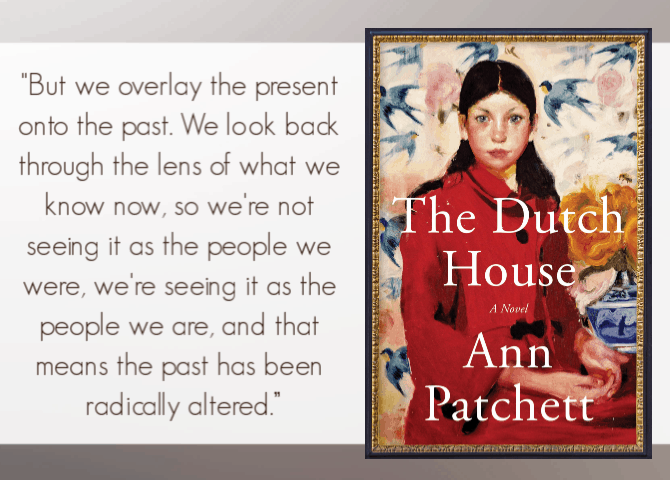
So You’ve Been Publicly Shamed, by Jon Ronson: This book was everywhere when it was published in 2015, and I can’t believe it took me this long to read it. Written by British journalist Jon Ronson, the book explores the resurgence of public shaming, specifically on the internet. Ronson shares stories of ordinary people whose seemingly innocuous transgressions (inappropriate comments online or missteps in the workplace) led to mass shaming, resulting in the crumbling of their professional and personal lives. Ronson spends some time looking into the history of public shaming and examines the ways that public shaming has become a cultural phenomenon that is not only acceptable but frequently viewed as desirable. He also digs into the efforts required to salvage one’s reputation once such shaming has taken place. (Spoiler: it’s very expensive.)
This book is terrifying. The notion that one small blunder could have such life-altering consequences is almost motivation enough to eliminate my own online presence, and I fear for what might be in store for my children as they one day make their foray into a frightening digital world full of wolves and trolls. I was aware that such public shaming existed, but the personal stories in this book made me even more conscious of the long-term damage done by this phenomenon—and also more mindful of how important it is to be kind on the internet!
While the premise is both culturally relevant and intriguing (albeit in a very cringy way), I struggled to finish this book. Ronson offers a peripheral view of some stories I wanted more of, and dives deep with others that I found less interesting or even applicable to the thesis of the book. There are a lot of names and facts and these overshadow the core themes and obscure the premise a bit.
As a journalist, Ronson doesn’t spend much time commenting on shame-culture (something I wanted him to do, even if it would have made the book less objective) and I wanted more discussion of why this is happening and how we can stop it, as well as an exploration of the potential upsides to public policing and how/why it might be more or less acceptable depending on the specific circumstances. (For instance, is it more appropriate to shame a public figure? Do worse transgressions merit deeper shaming?) The book is a good launching point for these important questions, and I wish Ronson had dug into them further. (I imagine Brené Brown’s work would make for a helpful pairing.) And while it’s a secular read, I would appreciate a look at this subject matter from a Christian perspective, with an exploration of how grace and forgiveness factor in.
A lot has changed in our world since 2015 and I’m curious what this book would be like if it were written today.
My Rating: 3 Stars.
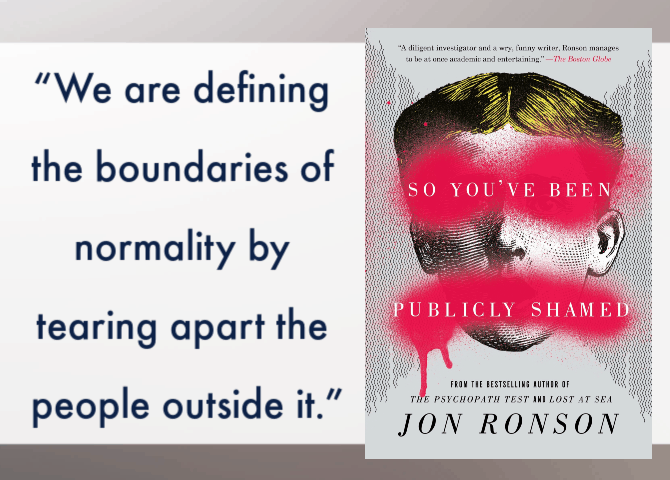
Personality Hacker: Harness the Power of Your Personality Type to Transform Your Work, Relationships, and Life, by Joel Mark Witt and Antonia Dodge: While I spend a lot of time these days talking and reading about the Enneagram (mostly because it’s gotten so popular), Myers-Briggs was my first foray into the world of personality frameworks. Personality Hacker was one of the first podcasts I started listening to, and I was excited when cohosts Joel and Antonia released a book diving deeper into the principles they explore on their show.
In this interactive guidebook, Joel and Antonia provide some background information about Myers-Briggs, explaining the four dichotomies (introversion/extraversion, sensing/intuition, thinking/feeling, and perceiving/judging). They dive into the eight cognitive functions that are at the core of each personality type, and they outline “The Car Model”, a system of understanding how they cognitive functions tend to interact with one another within each personality. A majority of the book is dedicated to chapters on each of the sixteen personality types.
I appreciate Joel and Antonia’s emphasis that studying Myers-Briggs (or any personality model) isn’t enough, but that we are to use this information gleaned about ourselves for personal development. They believe that Myers-Briggs not only helps us better understand and relate to those around us, but that it helps us to harness our own potential so that we are equipped to bring our bests selves into our work, relationships, and inner lives. To that end, each chapter includes practical exercises for personal growth catered to the various types.
The information in this book is extensive and pretty technical. Even having been familiar with many of the concepts thanks to the Personality Hacker podcast, quite a bit of the information went over my head. However, there is a ton of extremely enlightening and useful content that helped me understand myself in some new ways. I’ll definitely be referring back to this book as I continue on my personal growth journey, and if you are at all interested in Myers-Briggs, I’d highly recommend reading this.
My Rating: 4 Stars.
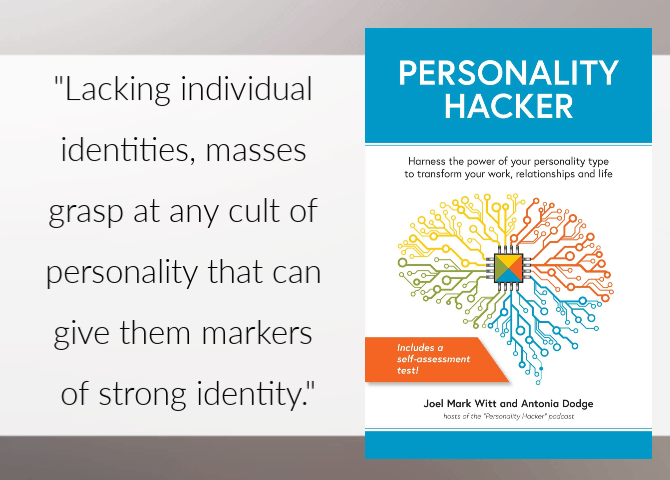
How has your reading life been? Are you reading more these days? Less? What is the best book you’ve read lately?
Personality Hacker sounds very interesting. I actually loved The Dutch House! I don’t mind if characters are unlikeable, I just like getting inside their heads.